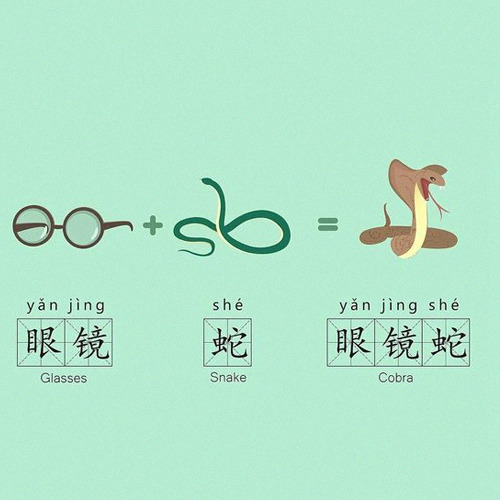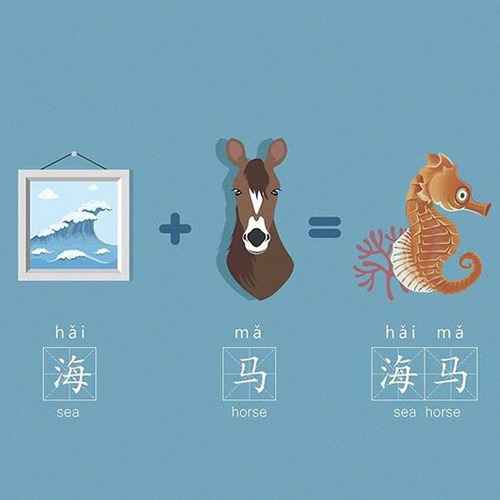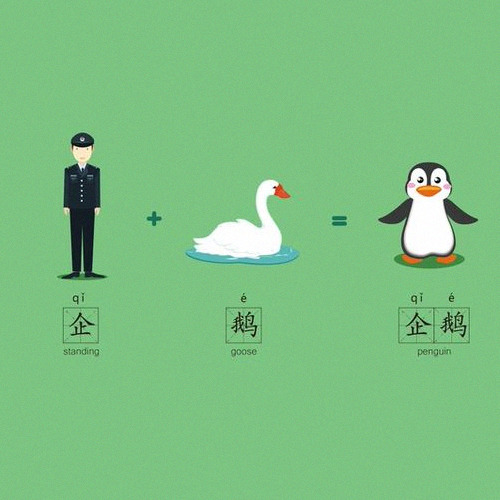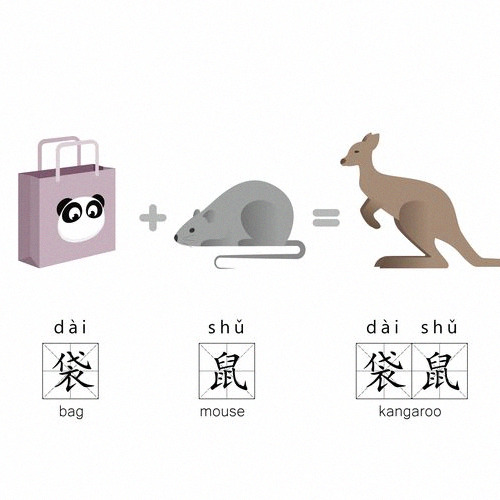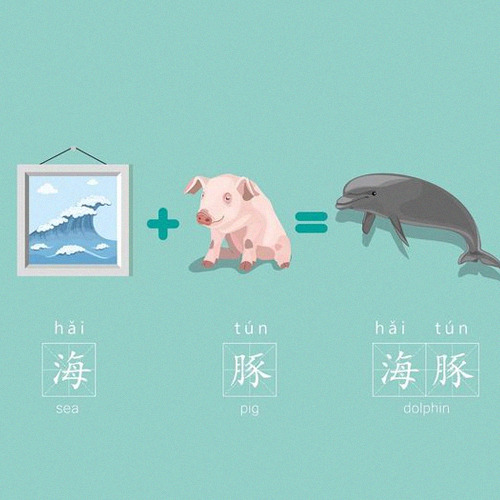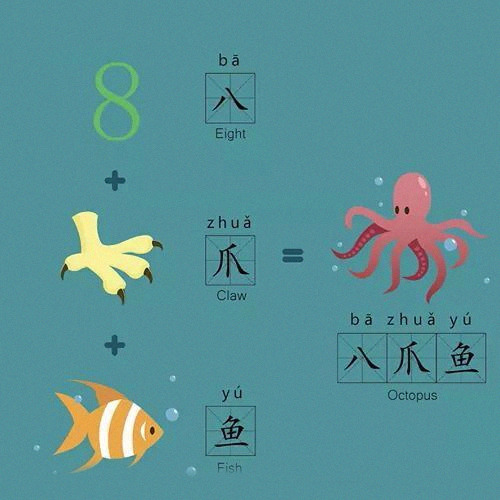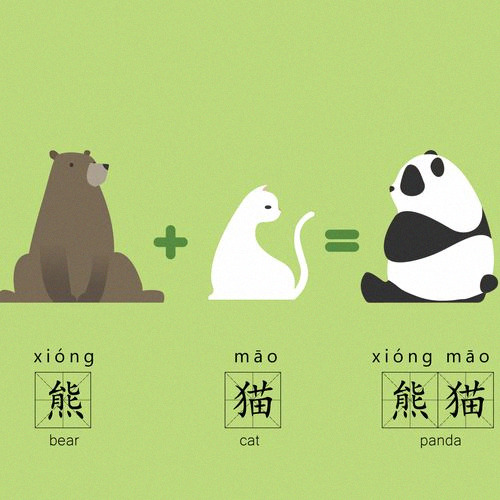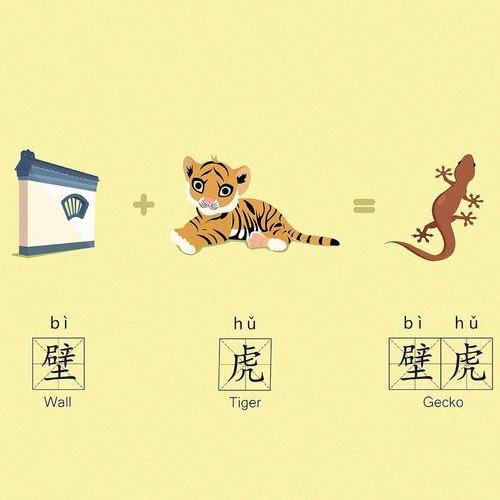Text
Korean Textbooks Master Post
Hello everyone! Here are some textbooks I had time to scan and upload (marked with an asterisk) or had found somewhere online. I hope you find something here that helps you! This post will be updated as I get more time to scan books, purchase more books, or if I happen to find more books online.
Can’t find the textbook you’re looking for on this list? Please feel free to hit up my ask! I may have it, but just haven’t scanned it yet.
Ewha Korean
Ewha Korean 1-1 Ewha Korean 1-2 Ewha Korean 3-2 Ewha Korean 4 Ewha Korean 5 Ewha Korean 6
KIIP Korean
KIIP Korean 0 KIIP Korean 1 KIIP Korean 2 KIIP Korean 3 KIIP Korean 4 KIIP Korean 5 KIIP Korean 6
Korean Grammar in Use
Korean Grammar in Use Beginner Korean Grammar in Use Intermediate Korean Grammar in Use Advanced
Sejong Korean
Sejong Korean 1 Sejong Korean 2 Sejong Korean 3 Sejong Korean 4 Sejong Korean 5 Sejong Korean 6 Sejong Korean 7 Sejong Korean 8
Sejong Korean Conversation 1 Sejong Korean Conversation 2 Sejong Korean Conversation 3 Sejong Korean Conversation 4
Sogang Korean
Sogang Korean 1A Sogang Korean 1B Sogang Korean 2A Sogang Korean 2B Sogang Korean 3A Sogang Korean 3B
TOPIK
빈도별 토픽 중고�� 어휘* 빈도별 토픽 중급 문법* TOPIK Essential Grammar 150 Hot TOPIK 2 Reading
Yonsei Korean
Yonsei Korean Grammar 1-1 Yonsei Korean Grammar 1-2 Yonsei Korean Grammar 2-1 Yonsei Korean Grammar 2-2 Yonsei Korean Grammar 3-1 Yonsei Korean Grammar 3-2 Yonsei Korean Grammar 4-1 Yonsei Korean Grammar 4-2 Yonsei Korean Grammar 5-1 Yonsei Korean Grammar 5-2 Yonsei Korean Grammar 6-1 Yonsei Korean Grammar 6-2
Yonsei Korean Reading 1 Yonsei Korean Reading 2 Yonsei Korean Reading 3 Yonsei Korean Reading 4 Yonsei Korean Reading 5
Miscellaneous:
Korean Stories for Language Learners* TTMIK Real Life Conversations (Intermediate)* Korean Reader for Chinese Characters Korean Slang Expressions Volume 2 Survival Korean
Last updated: 9/12/2019
4K notes
·
View notes
Text
Korean Lessons Masterlist

- Introduction
- Reading and Writing 한글
- Learn With K-POP
- Vocabulary and Phrases
- Grammar
- Korean Culture
- Sample Conversations
- My K-Recommendations
- Study Tips
- Korean History
3K notes
·
View notes
Text
The diference between
1.ㅐ and ㅔ
2.ㅒandㅖ
Currently, there is no sound difference. Some words will use one or the other based on the root of the word.
0 notes
Text
Love Scenario - iKON
벌써 - Already
미친 - Crazy
충분 - Enough
눈 - Eye(s)
느낌 - Feeling
나 - I
질투 - Jealous(y)
마지막 - Last
조명 - Light, Lighting
빛 - Light
사랑 - Love
멜로드라마 - Melodrama
추억 - Memory
기억 - Memory
더 - More
영화 - Movie
많이 - Much, Lots
이제 - Now
페이지 - Page
과거 - Past
조용히 - Quietly
갈비뼈 - Ribs
봄 - Spring
아프다 - To be painful
오늘 - Today
내일 - Tomorrow
너무 - Too, So
우리 - We, Us
830 notes
·
View notes
Text
Sports
양궁 - Archery
야구 - Baseball
농구 - Basketball
비치발리 - Beach volleyball
복싱 - Boxing
볼링 - Bowling
카누 - Canoeing
펜싱 - Fencing
미식축구 - Football (American)
골프 - Golf
체조 - Gymnastics
하키 - Hockey
유도 - Judo
조정 - Rowing
달리기 - Running
스키 - Skiing
축구 - Soccer (Football)
소프트볼 - Softball
수영 - Swimming
탁구 - Table tennis
태권도 - Taekwondo
테니스 - Tennis
배구 - Volleyball
역도 - Weightlifting
레슬링 - Wrestling
1K notes
·
View notes
Text
“世界上对勇气的最大考验是忍受败而不丧失信心。”
—
罗伯特·格林·英格索尔
“the greatest test of courage on earth is to bear defeat without losing heart.” -robert g. ingersoll
99 notes
·
View notes
Text
Chinese vocabulary: Family

家 jiā - home, family
妈妈 mā ma - mom
母亲 mǔ qin - mother
爸爸 bàba - dad
父亲 fù qīn - father
兄弟姐妹 xiōng dì jiě mèi -siblings
弟弟 dìdi - younger brother
哥哥 gē ge - older brother
妹妹 mèi mei - younger sister
姐姐 jiě jie - older sister
祖父母 zǔ fù mǔ - grandparents
外婆 wài pó - maternal grandmother
奶奶 nǎi nai - paternal grandmother
爷爷 yé ye - paternal grandfather
外公 wài gōng - maternal grandfather
伯伯 bó bo - father’s older brother
叔叔 shū shu - father’s younger brother
舅舅 jiù jiu - mother’s brother
叔叔 shū shu - uncle (general meaning)
阿姨 Ā yí - aunt (general meaning)
姑姑 gū gu - father’s sister
姨妈 yí mā - mother’s sister
孩子 hái zi - children
儿子 Ér zi - son
女儿 nǚ’ér - daughter
584 notes
·
View notes
Text

51-75
看见 kànjiàn to see
块 kuài unit of currency
来 lái to come
老师 lǎoshī teacher
了 le (completed action marker)
冷 lěng cold
里 lǐ inside
六 liù six
吗 ma (question tag)
妈妈 māma mother
买 mǎi to buy
猫 māo cat
没关系 méi guānxi it doesn’t matter
没有 méiyǒu haven’t
米饭 mǐfàn cooked rice
名字 míngzi name
明天 míngtiān tomorrown
哪 nǎ which (interrogative, followed by a classifier or numeral-classifier)
哪儿 nǎr where
那 nà that
呢 ne (question particle for subjects already mentioned)
能 néng to be able to
你 nǐ you (informal)
年 nián year
女儿 nǚer daughter
116 notes
·
View notes
Text
language learning made easy
I’ve summarized professor Alexander Arguelles’ video, because I think this is crucial for language learning.
There is no magic trick that will help you become fluent in 1 month, but there are very effective approaches to learning a new language and if you combine them, you will surely become fluent.
If you’re learning a new language, the most important thing you need to consider is – what type of language learner are you?
1. If you:
have a more deductive approach, which means that you’re better at listening to and observing the language first and learning through that, rather than starting with plain grammar points from a textbook
have a fair degree of intuition
like to observe a phenomenon
feel somewhat comfortable with ambiguity for a while, until things become clear
are someone who can feel comfortable being corrected when they realize they were wrong, rather than getting confused and frustrated because they went down an initial path that turned out not to be correct (so you actually learn from being corrected and you don’t get confused by it)
then, these manuals are best suited for you: the Assimil Language Series, the Linguaphone Series, the Cortina Methods.
2. If you:
have a desire to have things explained to you beforehand in a nice and clear way
have a logical and analytical mind (which is usually the product of education in general)
have a need for a systematic approach (basically if you’re most comfortable with a book which is going to introduce the grammar according to an agreed set of methods or an organized plan)
then, you should try out some of these manuals: the Hugo Series, the Made Simple Series, the Teach Yourself Series, the Buske Series.
3. PAY ATTENTION TO PATTERNS!!!
the most important part are the patterns of a language
no matter what type of language learner you are, I think it’s really clever to incorporate this method into you learning.
a language is actually made up of patterns which constantly repeat themselves and that is THE KEY TO FLUENCY
repeating the patterns over and over again, until they become natural, until you no longer have to conjugate the verbs in your head before speaking
when you become really good with patterns, your sentences will come out naturally, and patterns are what will get you to fluency
I’ve provided the links, where you will find a review of the books, so that you can have an idea of what they look like. You can find most of these on amazon.
There is also an amazing blog on here, which provides free books, and I think that you can find half of these series for free there. @lovelybluepanda
21K notes
·
View notes
Text
跟...比起来 (mandarin grammar)
跟…比起来 is a way of making comparisons
the structure is as follows:
noun (phrase) 1+跟+noun (phrase) 2+比起来, comment
OR
跟+noun 1+比起来, noun 2 +verb phrase
*note: when i looked it up to check my facts i saw you can apparently also use 和 in place of 跟
the comment that follows 比起来 is the comparison between the two nouns and should use words like 最,比较,一点,得多,and 多了
structure 1: noun (phrase) 1+跟+noun (phrase) 2+比起来, comment
*in this first structure, you’re comparing noun 1 to noun 2, so the comment will probably have something to do with noun 1 if it’s a statement*
猫跟狗比起来,我更喜欢猫。
Between cats and dogs, I like cats more.
[here it would be as a question] 猫跟狗比起来,你更喜欢哪一个?
Between cats and dogs, which do you like more?
对我来说,中文课跟数学课比起来,中文课好玩得多。
To me, when comparing Chinese and math class, Chinese class is more fun.
用洗衣机洗衣服跟自己用手洗衣服,你觉得那一个更容易?
Which is easier: using a washer to wash your clothes or washing them by hand?
structure 2: 跟+noun 1+比起来, noun 2 +verb phrase
*in this second structure noun 1 is what noun 2 is being compared to*
跟你比起来,我漂亮多了。
Compared to you, I’m way prettier
跟我的电话费比起来,我的学费比较贵。
My tuition is more expensive than my phone bill.
跟鸡肉比起来,牛肉最好吃。
compared to chicken, beef is the most delicious.
so that’s it since i’m in the middle of finals and feel a little out of it, there might be a couple mistakes. if you notice any please please tell me (preferably through an ask so i’m more likely to see it)
404 notes
·
View notes
Text
나라 Countries
1.독일 Turkey
2. 러시아 Russia
3. 미국 United States
4. 베트남 Vietnam
5. 일본 Japan
6. 중국 China
7. 태국 Taiwan
8.한국 Korea
9. 캄보디아 Cambodia
10. 필리핀 Philippines
Additional words:
씨 Miss
사람 person
네 yes/affirmation
Example:
소라 씨, 한국 사람이에요?
Miss Sora, are you korean?
네, 한국 사람이에요.
Yes, I'm korean.
Ukaru 18.11.15
1 note
·
View note
Text
The 5 Best Revisions Methods I Want to Start Using
Hi, guys! Whilst planning my next few months to do well on my final exams, I started researching and found a few great study techniques that are a bit underrated. Thus, I compiled a post with information about each one and all the materials you need to put them to use. These are most useful if you’ve already studied the material and are now starting to revise.
A. Feynman Technique
This method was coined by Nobel Prize winner Richard Feynman. This system works by writing down everything you remember about the topic you’re currently revising in a blank piece of paper. When you get stuck, go back to your study materials. The gaps in your knowledge should be blatant after you finish. Review and simplify. Keep repeating until you know for certain that there’s nothing left out and you’ve successfully learned the topic. :-)
For this method you will need:
Blank piece of paper
Pen/Pencil
B. Spaced Repetition
This method has been gaining traction for the past few years but it still doesn’t get the recognition it should. It’s fairly simple. It consists of time intervals between study sessions, which allows you store information better in your long-term memory. While there aren’t set times for when to do your next revision session, I’d recommend the one by Piotr Wozniak:
First repetition: 1 day
Second repetition: 7 days
Third repetition: 16 days
Fourth repetition: 35 days
This method can be used both through an analog system and a digital one.
One of the simplest techniques to implement spaced repetition while using paper flashcards is the Leitner system. First, you decide how many boxes you need for your system. Each of your boxes represents a different study time interval:

Every flashcard starts out in Box 1. When you get a flashcard right, it passes to the next box. If you get a card wrong, it goes back to Box 1 – even if it was on Box 4. This makes sure you are constantly reviewing the materials. Remember to devise a calendar with the dates and boxes you need to revise each day.
For this method you will need:
Boxes or simply different colored rubbers to differentiate the piles
Flashcards
Pen/Pencil
If however, you prefer a digital method, Anki is the best option for you. It is available online, on both Windows & Mac and there’s also an incredible practical app. It uses the spaced repetition method while taking the trouble of having to hand write hundreds of flashcards and remembering when to study each one.
Simply create an account, then a deck in which you’ll add your flashcards. The app and website allow you to add images and/or sounds to the flashcards. Customize them all you want. Once you’ve finished, save them and check the app every day to revise the flashcards of the day.
For this method you will need:
Anki app (iOS, Android) and/or website
C. Past Papers
I’ve been guilty in the past for not using this method. I got so caught up in my perfectionism that I didn’t even want to try. I learned, though, that getting things wrong is not a sign of failure and that persisting until you get it right is the real strength (and discipline) you ought to have. Do not let your procrastination and/or perfectionism prevent you from learning your weaknesses on a topic and not reach the grade you were hoping for.
Time yourself while taking the test and then correct your answers with a different colored pencil/pen so you can differentiate between correct and wrong answers.
For this method you will need:
Past papers
Pen/Pencil
D. Teach someone
This method is really helpful if you have oral assessments and/or your professor uses the Socratic method in class. You can practice your speech and knowledge all at the same time. Find someone who’s willing to listen to you talk about the topic you’re studying. Even if no one’s willing, you can still explain the matter to an object in the house. Don’t get embarrassed by this! While speaking, you’re organising your thoughts and only when explaining to someone else can you really assess your knowledge.
For this method you will need:
Your voice
Someone/Something who loves you very much
E. Proper sleep & exercise
Yes, I know, these aren’t revisions methods. But as helpful as the previous systems were, they won’t work if you aren’t sane in body and spirit. It’s incredibly important that you rest. Teenagers (13 to 17 years old) ought to sleep from 8 to 10 hours every day, while young adults (18 to 25) only need 7 to 9. You should also get fresh air and exercise. This helps with mental alertness, concentration, an efficient memory and a positive mood. Stay hydrated throughout the day. & please, don’t skip meals!
For this method you will need:
Proper sleep (x, x, x, x, x)
Exercise (x, x, x)
Healthy diet (x, x, x, x)
12K notes
·
View notes
Text
I enjoy learning languages. However, as a college student I have many others tasks and assignments to do, so I need to organise wisely my time.
Next month I will take a test, hsk 2, so, I will be posting vocabulary and examples with the new words.
18.11.14
0 notes
Photo





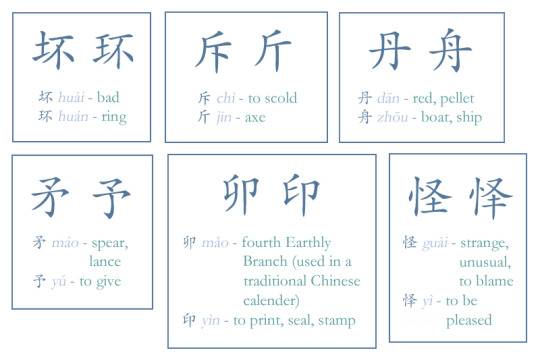
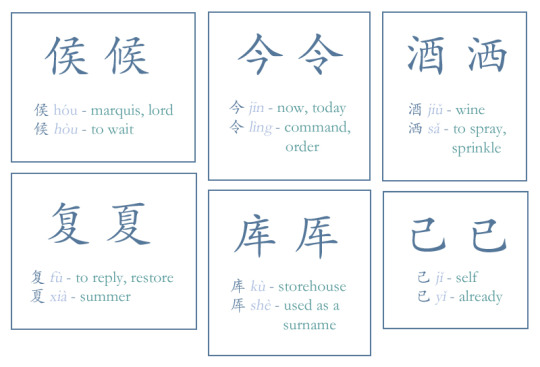
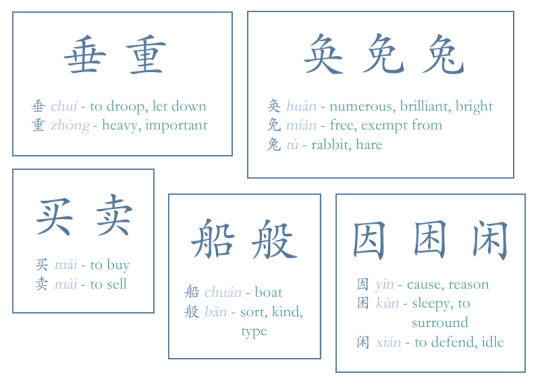
Adapted from the series Easily Confused Chinese Characters
4K notes
·
View notes
Text
Mandarin Romance Vocab

As a hopeless romantic, there’s no vocab list that comes easier to me! 浪漫 - romance [làngmàn] 浪漫的 - romantic [làngmàn de] 爱情 - love [àiqíng] 夫妻 - couple [fūqī] 婚礼 - marriage [hūnlǐ] 权宜婚姻 - marriage of convenience [quányí hūnyīn] 婚礼 - wedding [hūnlǐ] 巧克力 - chocolate [qiǎokèlì] 花 - flowers [huā] 礼物 - gift [lǐwù] 心脏 - heart [xīnzàng] 心形物 - heart (shape) [xīnxíngwù] 感情问题 - matters of the heart [gǎnqíng wèntí] 使某人伤心 - to break somebody’s heart [shǐ mǒurén shāngxīn] 心碎了 - to have a broken heart [xīnsuìle] 是某人所关心的 - to be close/dear to one’s heart [shì mǒurén suǒ guānxīn de] 调情者 - flirt [tiáoqíngzhě] 风流韵事 - affair [fēngliú yùnshì] 情人 - lover [qíngrén] 丈夫 - husband [zhàngfu] 妻子 - wife [qīzi] 男朋友 - boyfriend [nánpéngyou] 女朋友 - girlfriend [nǚpéngyou] 心上人 - sweetheart [xīnshàngrén] 亲爱的 - darling [qīn'ài de] 喜爱 - affection [xǐ'ài] 亲爱的 - sweetheart [qīn'àide] 亲昵 - intimacy [qīnnì] 情爱 - passion [qíng'ài] 情人节 - Valentine’s Day [Qíngrén Jié] 吻 - kiss [wěn] 拥抱 - cuddle [yōngbào] 一起 - together [yīqǐ] 吸引力 - attraction [xīyǐnlì] 宝贝 - baby [bǎobèi] 亲密的关系 - relationship [qīnmì de guānxì] 爱 - to love [ài] 和 … 约会 - to date [hé … yuēhuì] 结婚 - to marry [jiéhūn] 调情 - to flirt [tiáoqíng] 接吻 - to kiss [jiēwěn] 吻某人一下 - to give somebody a kiss [wěn mǒurén yīxià] 搂抱 - to cuddle [lǒubào] 引起 - to attract [yǐnqǐ] 关系亲密 - to have a good relationship [guānxì qīnmì] 喜欢某人 - to feel affection for somebody [xǐhuān mǒurén] 赢得某人的爱慕 - to win somebody’s affection [yíngdé mǒurén de àimù] 迷恋某人 - to have a crush on somebody [míliàn mǒurén] 受到某人的宠爱 - to be somebody’s darling [shòudào mǒurén de chǒng'ài] 发生暧昧关系 - to have an affair [fāshēng àimèi guānxi] 恋爱 - to be in love [liàn'ài] 爱上 - to fall in love [àishàng] 做爱 - to make love [zuò'ài] 一见钟情 - love at first sight [yī jiàn zhōngqíng] 我爱你。- I love you. [Wǒ ài nǐ.] 你没事吧?- Are you okay, love? [Nǐ méi shì ba?] 我想你 - I miss you [wǒ xiǎng nǐ] 我想跟你在一起 - I want to be with you [wǒ xiǎng gēn nǐ zài yīqǐ] 我喜欢你 - I fancy you [wǒ xǐhuan nǐ] 你愿意嫁给我吗? - Will you marry me? [nǐ yuànyi jià gěi wǒ ma?] 我的心里只有你 - In my heart there is only you [wǒ de xīnlǐ zhǐ yǒu nǐ] 跟你在一起真开心 - I’m so happy with you [gēn nǐ zài yīqǐ zhēn kāixīn]
Shoutout to fluentinmandarin, particularly in the phrases section of this list!
3K notes
·
View notes









